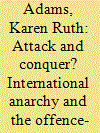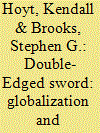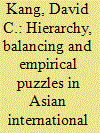| Srl | Item |
| 1 |
ID:
050842


|
|
|
|
|
| Publication |
Winter 2003-04.
|
|
|
|
|
|
|
|
|
|
|
|
|
|
|
|
| 2 |
ID:
050844


|
|
|
|
|
| Publication |
Winter 2003-04.
|
|
|
|
|
|
|
|
|
|
|
|
|
|
|
|
| 3 |
ID:
050846


|
|
|
|
|
| Publication |
Winter 2003-04.
|
|
|
|
|
|
|
|
|
|
|
|
|
|
|
|
| 4 |
ID:
050843


|
|
|
|
|
| Publication |
Winter 2003-04.
|
|
|
|
|
|
|
|
|
|
|
|
|
|
|
|
| 5 |
ID:
050841


|
|
|
|
|
| Publication |
Winter 2003-04.
|
|
|
|
|
|
|
|
|
|
|
|
|
|
|
|
| 6 |
ID:
050845


|
|
|
|
|
| Publication |
Winter 2003-04.
|
| Summary/Abstract |
Post-Cold War debates about Asian security have been dominated by Aaron Friedberg's influential image of a region seemingly "ripe for rivalry." 1 Friedberg stressed Asia's lack of stability-enhancing mechanisms of the kind that sustains peace in Europe, such as its high levels of regional economic integration and regional institutions to mitigate and manage conflict. Other pessimists foresaw regional disorder stemming from Asian states' attempts to balance a rising China. Taken together, such views have shaped a decade of thinking about Asian security in academic and policy circles.
Now, in a recent article in International Security entitled "Getting Asia Wrong: The Need for New Analytical Frameworks," David Kang offers an alternative view that is both timely and provocative. Kang finds that "Asian states do not appear to be balancing against... China. Rather they seem to be bandwagoning" (p.58). He then presents an indigenous Asian tradition that could sustain regional order: the region's historical acceptance of a "hierarchical" interstate order with China at its core. "Historically," Kang suggests, "it has been Chinese weakness that has led to chaos in Asia. When China has been strong and stable, order has been preserved. East Asian regional relations have historically been hierarchic, more peaceful, and more stable than those in the West" (p.66). After faulting Western scholarship for taking an essentially Eurocentric approach to Asian security, Kang calls for bringing international relations theory more in tune with Asian realities. He also asserts that scholars should strive for a better match between their theoretical tools and the evidence on the ground. Taking cognizance of Asia's different pathway to national sovereignty and regional order, Kang argues, would open the door to new and exciting advances [End Page 149] for the study of Asian security, which in turn would enrich the field of international...
|
|
|
|
|
|
|
|
|
|
|
|
|
|
|
|